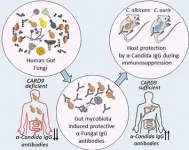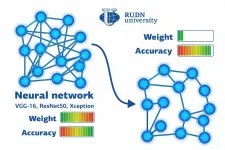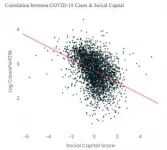Fungi in the gut prime immunity against infection
2021-02-05
(Press-News.org) Common fungi, often present in the gut, teach the immune system how to respond to their more dangerous relatives, according to new research from scientists at Weill Cornell Medicine. Breakdowns in this process can leave people susceptible to deadly fungal infections.
The study, published Feb. 5 in Cell, reveals a new twist in the complex relationship between humans and their associated microbes, and points the way toward novel therapies that could help combat a rising tide of drug-resistant pathogens.
The new discovery stemmed from work on inflammatory bowel disease, which often causes patients to carry larger than normal populations of fungi in their guts. These patients often develop strong antibody responses against mannan, a molecule common to a wide range of fungal species. However, Dr. Iliyan Iliev, associate professor of immunology in medicine in the Division of Gastroenterology and Hepatology at Weill Cornell Medicine, noticed that healthy controls in these studies also had some level of anti-fungal antibodies. "There was no actual evidence for fungal infections in the healthy individuals that we examined, so we started thinking about the possible function of those antibodies," said Dr. Iliev, who is senior author on the study and a member of the Jill Roberts Institute for Research in Inflammatory Bowel Disease.
The team developed a platform that allowed them to determine which gut fungi are targeted by antibodies in the blood of individual patients. They detected a strong response against the yeast Candida albicans. Turning to experiments in mice, Dr. Iliev and Itai Doron, a Weill Cornell Medicine Graduate School of Medical Sciences doctoral candidate in the lab and lead author on the study, found that colonizing the animals' guts with Candida albicans caused them to develop antibodies against the fungus in their bloodstreams, even though they didn't develop blood-borne fungal infections. Instead, the animals' immune cells appeared to transport fungal antigens to the spleen, stimulating the production of circulating antibodies in the bloodstream. "Those fungi just educate that immune response," Dr. Iliev said.
In patients with suppressed immune systems, such as organ transplant recipients and some cancer patients, fungi in the gut can invade the bloodstream and cause life-threatening infections. Dr. Iliev and his colleagues mimicked this process by treating mice with immunosuppressive drugs. When a Candida species colonizes the gut of these mice, the fungus moves into the bloodstream, causing a fatal infection. Treating the mice with purified anti-fungal antibodies from donor animals protected the immunosuppressed mice from these infections. The same strategy worked against infection with either Candida albicans or the emerging pathogenic yeast Candida auris, which has become a major cause of fungal disease in immunosuppressed patients and the elderly in recent years.
Collaborating with researchers at INSERM in Paris, France, the Weill Cornell Medicine team also looked at serum from patients with mutations in a gene called CARD9. This mutation affects a critical adapter protein in the immune system, leaving the affected individuals susceptible to severe fungal infections. Dr. Iliev's team found that the serum of these patients lacked the anti-fungal antibodies normally seen in serum of patients without this mutation. Experiments in mice confirmed an essential and specific role for CARD9 in priming the production of anti-fungal antibodies.
Graphic depicting relationship between fungi in gut, antibody levels and CARD gene
Relationship between gut fungi, anti-fungal antibodies, CARD9 gene, and fungal immunity. Image courtesy of the Iliev lab.
The results suggest that normal intestinal fungi such as Candida albicans may function as a kind of intestinal vaccine against fungal infection in healthy people, by inducing the production of bloodborne antibodies that can target multiple species of potentially pathogenic fungi. When those fungi do enter the bloodstream, the antibodies bind them and target them for destruction by cells of the immune system. In patients with suppressed immunity, the anti-fungal antibodies may decline, leaving them vulnerable to fungal infection. New therapies that involve either stimulating the production of anti-fungal antibodies, or injecting such purified antibodies directly into patients' bloodstreams, could potentially help combat these increasingly common infections.
If that approach works, it would be a welcome development. "Many fungal infections in immunosuppressed patients and elderly patients are happening by translocation of pathogenic Candida species from the gastrointestinal tract, and the survival rates upon systemic spreading are alarmingly low," said Dr. Iliev.
INFORMATION:
[Attachments] See images for this press release:

ELSE PRESS RELEASES FROM THIS DATE:
2021-02-05
To arrive at Nunavut, turn left at the Dakotas and head north. You can't miss it--the vast tundra territory covers almost a million square miles of northern Canada. Relatively few people call this lake-scattered landscape home, but the region plays a crucial role in understanding global climate change. New research from Soren Brothers, assistant professor in the Department of Watershed Sciences and Ecology Center, details how lakes in Nunavut could have a big impact on carbon dioxide levels in the atmosphere, and it's not all bad news--at least for now. Brothers examined 23 years of data from lakes near Rankin Inlet. He noted a peculiarity--as the lakes warmed, their carbon dioxide concentrations fell. ...
2021-02-05
A team of mathematicians from RUDN University found a way to reduce the size of a trained neural network six times without spending additional resources on re-training it. The approach is based on finding a correlation between the weights of neural connections in the initial system and its simplified version. The results of the work were published in the Optical Memory and Neural Networks journal.
The structures of artificial neural networks and neurons in a living organism are based on the same principles. Nodes in a network are interconnected; some of them receive a signal, and some transmit it by activating or suppressing the next element in the chain. The processing of any signal (for ...
2021-02-05
The discovery of an "Achilles heel" in a type of gut bacteria that causes intestinal inflammation in patients with Crohn's disease may lead to more targeted therapies for the difficult to treat disease, according to Weill Cornell Medicine and NewYork-Presbyterian investigators.
In a study published Feb. 3 in Cell Host and Microbe, the investigators showed that patients with Crohn's disease have an overabundance of a type of gut bacteria called adherent-invasive Escherichia coli (AIEC), which promotes inflammation in the intestine. Their experiments revealed ...
2021-02-05
Progressive vision loss, and eventually blindness, are the hallmarks of juvenile neuronal ceroid lipofuscinosis (JNCL) or CLN3-Batten disease. New research shows how the mutation associated with the disease could potentially lead to degeneration of light sensing photoreceptor cells in the retina, and subsequent vision loss.
"The prominence and early onset of retinal degeneration in JNCL makes it likely that cellular processes that are compromised in JNCL are critical for health and function of the retina," said Ruchira Signh, Ph.D., an associate professor in the Department of Ophthalmology and Center for Visual Science and lead author of the study which appears in the journal Communications Biology. "It is important to understand how vision loss is triggered in this disease, ...
2021-02-05
Washington, D.C.. -- The onset of the COVID-19 pandemic caused a sharp decline in living standards and rising food insecurity in developing countries across the globe, according to a new study by an international team of economists.
The study, published Feb. 5 in the journal Science Advances, provides an in-depth view of the health crisis's initial socioeconomic effects in low- and middle-income countries, using detailed micro data collected from tens of thousands of households across nine countries. The phone surveys were conducted from April through July 2020 of nationally and sub-nationally representative samples in Bangladesh, Burkina Faso, Colombia, Ghana, Kenya, Nepal, Philippines, Rwanda, and Sierra Leone. Across the board, study ...
2021-02-05
The largest single cell study to date of the childhood cancer, neuroblastoma, has answered important questions about the genesis of the disease. The researchers from the Wellcome Sanger Institute, Great Ormond Street Hospital (GOSH) and the Princess Máxima Center for Pediatric Oncology, discovered that all neuroblastomas arise from a single type of embryonic cell called sympathoblasts.
The study, published today (5 February 2021) in Science Advances, sought to understand why neuroblastomas range in severity, with some easy to treat and others having relatively low five-year survival rates. The fact that all neuroblastomas arise from sympathoblasts makes them an attractive ...
2021-02-05
Berkeley -- The onset of the COVID-19 pandemic last year led to a devastating loss of jobs and income across the global south, threatening hundreds of millions of people with hunger and lost savings and raising an array of risks for children, according to new research co-authored at the University of California, Berkeley.
The research, to be published Friday Feb. 5, 2021, in the journal Science Advances, found "staggering" income losses after the pandemic emerged last year, with a median 70% of households across nine countries in Africa, Asia and Latin America reporting financial losses. By April last year, roughly 50% ...
2021-02-05
Scientists led by Eliza Harris and Michael Bahn from the Institute of Ecology at the University of Innsbruck have succeeded in studying emissions of the greenhouse gas N2O under the influence of environmental impacts in an unprecedented level of detail. The study, which has now been published in Science Advances, is thus also a starting point for the creation of models that could predict future trends in the greenhouse gas emission dynamics of ecosystems under global climate change.
Nitrous oxide (N2O) is a potent greenhouse gas whose atmospheric growth rate has accelerated over the past decade. The largest share of anthropogenic N2O emissions results from the fertilization of soils with nitrogen, which is converted into N2O via various abiotic ...
2021-02-05
Genes that determine the shape of a person's facial profile have been discovered by a UCL-led research team.
The researchers identified 32 gene regions that influenced facial features such as nose, lip, jaw, and brow shape, nine of which were entirely new discoveries while the others validated genes with prior limited evidence.
The analysis of data from more than 6,000 volunteers across Latin America was published today in Science Advances.
The international research team, led from UCL, Aix-Marseille University and The Open University, found that one of the genes appears ...
2021-02-05
US counties with more social capital have fewer COVID-19 infections and deaths - perhaps because these communities have greater concern for the health of others.
INFORMATION:
Article Title: "How social capital helps communities weather the COVID-19 pandemic"
Funding: This research was supported by a grant from the Canadian Institutes of Health Research [CIHR, FRN-170368; PI: Cary Wu].
Competing Interests: The authors have declared that no competing interests exist.
Article URL: https://journals.plos.org/plosone/article?id=10.1371/journal.pone.0245135
...
LAST 30 PRESS RELEASES:
[Press-News.org] Fungi in the gut prime immunity against infection





